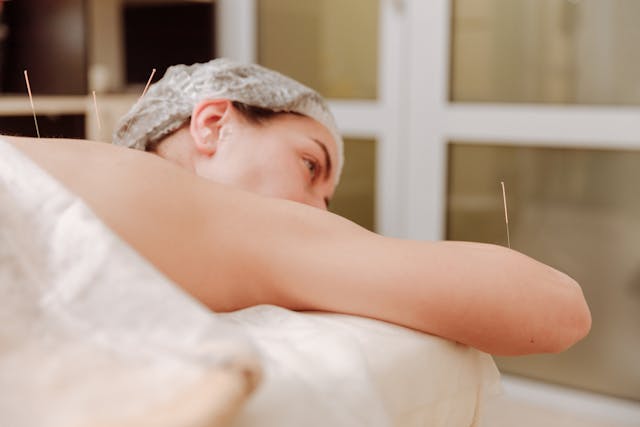For centuries, acupuncture has served as an extensive therapeutic practice, which tackles both physical and emotional health through a holistic approach. Coming from traditional Chinese medicine (TCM), includes the insertion of fine needles into specific points along the meridians of the body. This method is intended to restore the flow of Qi (vital energy), to promote wellness and to activate the natural healing mechanisms of the body.
Nowadays, acupuncture is recognized worldwide because of the ability to relieve pain, reduce stress and improve overall health. Wellness clinics such as ACA Acupuncture and well -being Provide targeted acupuncture treatments that are designed to tackle various health problems, from chronic discomfort and hormonal imbalances to digestive problems and mental clarity. With competent practitioners and a dedication to individualized care, acupuncture becomes a valuable tool for promoting well -being in the long term.
What is acupuncture?
Acupuncture is a therapeutic practice rooted in the principles of traditional Chinese medicine, focused on the meridian system of the body to regulate the flow of Qi (vital energy). It is assumed that disruptions in this stream contribute to physical and emotional imbalances, which leads to various health problems. By inserting thin, sterile needles in specific points, acupuncture practitioners stimulate the nerve endings, they stimulate blood flow and cause the release of natural pain relieving chemicals such as endorphins.
Practice is widely used to tackle disorders such as chronic pain, insomnia, digestive disorders and challenges in the field of mental health. Although acupuncture is often associated with pain relief, its benefits extend to improve overall health by restoring the balance and promoting the inherent healing skills of the body.

Top 10 benefits of acupuncture
1. Pain lighting
Acupuncture is generally recognized because of its effectiveness in relieving different forms of pain, from chronic conditions such as arthritis to acute injuries such as muscle tensions and sprains. The practice includes the inserting of fine needles on specific points along the meridians of the body, which helps to stimulate the release of endorphins, the natural painkillers of the body.
In addition, acupuncture reduces inflammation by promoting blood circulation, delivering essential nutrients and oxygen to the affected areas. It is especially beneficial for those who experience migraine, low back pain, neck stiffness and fibromyalgia. Research also suggests that acupuncture can help to modulate pain perception by changing the way in which the brain processes pain signals, making it a valuable additional therapy for chronic pain management.
2. Stress reduction
Chronic stress can significantly influence physical and emotional health, which contributes to muscle tension, headache, digestive problems and anxiety. Acupuncture activates the parasympathetic nervous system, which promotes relaxation and helps to regulate the body’s stress response. By focusing on specific points, such as it associated with the heart, liver and kidneys, acupuncture can lower the cortisol levels and calm the mind.
This process promotes a sense of peace, reduces anxiety symptoms and improves overall emotional stability. Many patients report that they feel deeply relaxed after a session, where some people experience a lasting sense of calmness that goes beyond the treatment. Acupuncture also helps to balance the energy flow of the body, with regard to underlying imbalances that can contribute to stress and tension.
3. Improved sleep quality
For individuals who struggle with insomnia or disturbed sleep patterns, acupuncture can serve as a natural remedy to restore a relaxing sleep. Practice focuses on points that influence the nervous system and promote the release of neurotransmitters such as serotonin and melatonin. These chemicals play a crucial role in regulating sleep cycles, reducing nocturnal awakening and improving overall sleep quality. Acupuncture also relieves tension and anxiety, which are common contributors to sleep disorders. In addition, treatment can help with tackling sleep -related problems arising from digestive trot or hormonal imbalances. Over time, regular acupuncture sessions can help determine a consistent sleep routine, allowing the body to charge and restore the natural rhythm.
4. Support for digestion
Digestive disorders such as bloating, constipation and irritable bowel syndrome (IBS) can significantly influence the quality of life. Acupuncture can be a valuable tool in supporting digestion by stimulating points that regulate the gastrointestinal system. By promoting the right energy flow through the stomach and intestines, acupuncture helps to relieve symptoms such as nausea, acid reflux and abdominal cramps. In addition, practice stimulates optimum absorption of nutrients and eliminating waste, which can be particularly beneficial for people with chronic digestive conditions. Acupuncture can also tackle emotional stress, which is often linked to digestive disorders, creating a more harmonious internal environment that promotes the improved digestion.
5. Boost of the immune system
A strong immune system is of vital importance for defending diseases and restoring infections. Acupuncture stimulates points associated with the lymphatic system of the body, promoting the production of white blood cells that help fight pathogens. By improving blood circulation, acupuncture ensures that immune cells are effectively distributed throughout the body, thereby strengthening overall immune function. It can also relieve the symptoms of chronic inflammation, which is a common underlying factor in weakened immunity. In addition, acupuncture helps to balance the internal energy of the body, to reduce stress and prevent circumstances that can endanger the immune system, such as chronic fatigue and frequent cold. Regular sessions can serve as a preventive measure and strengthen the defense of the body against seasonal diseases and infections.
6. Hormonal balance
Hormonal fluctuations can manifest themselves as mood swings, menstrual irregularities, hot flashes and chronic fatigue. Acupuncture offers a natural approach for regulating hormone levels by focusing points on the endocrine system. This can be particularly beneficial for those who experience PMS, menopause or thyroid balances. Treatment helps to stimulate hormone -producing glands, encouraging the release of useful hormones, while excess levels of stress -related hormones are reduced. In addition, acupuncture can relieve the symptoms associated with hormonal imbalances, such as bloating, mood swings and insomnia. By promoting the balance within the endocrine system, acupuncture not only tackles the symptoms, but also tackles the cause of hormonal disturbances, which promotes long -term stability.
7. Breathing support
For people who are dealing with asthma, allergies or sinusitis, acupuncture can offer targeted lighting by reducing inflammation in the respiratory tract. Practice includes stimulating points that promote lung function, delete nose passages and regulate breathing. Acupuncture can also help relieve symptoms such as coughing, squeaky breathing and breast covering by relaxing bronchial muscles and promoting blood circulation to the lungs. In addition, it deals with the root causes of breathing problems, such as imbalances of stress or immune system, creating a more favorable environment for healing. Regular acupuncture sessions can reduce the frequency and severity of respiratory flare-ups, making it an effective additional therapy for chronic respiratory diseases.
8. Emotional well -being
Acupuncture has long been used to tackle mental and emotional health, in particular disorders such as anxiety, depression and mood disorders. By stimulating points that influence the release of neurotransmitter, acupuncture promotes the production of serotonin, dopamine and endorphins – chemicals that regulate the mood and relieve stress.
This can lead to a feeling of calm and emotional stability, reducing the impact of stress and preventing mood fluctuations. In addition, acupuncture helps to balance the energy flow of the body, with regard to emotional blockages that can contribute to feelings of sadness, anger or frustration. Patients often report that they are lighter and more centered after treatment, as the mind and the body are more aligned.
9. Injury recovery
Acupuncture is generally recognized for its role in accelerating the recovery process for injuries, including muscle tensions, ligament disgues and postoperative wounds. By promoting blood circulation to affected areas, acupuncture helps to deliver essential nutrients and oxygen that help recover tissues. It also reduces inflammation, relieves muscle tension and improves the range of movement, making it a valuable addition to physical rehabilitation programs.
Acupuncture can also tackle pain that is related to injuries, minimizing the need for pharmaceutical interventions and supporting a more natural recovery process. For athletes and people with a physically demanding lifestyle, acupuncture serves as an effective therapy for maintaining mobility and preventing recurring injuries.
10. Cognitive function
Brain fog, poor concentration and memory challenges can be exacerbated by stress, fatigue and energy balances. Acupuncture stimulates points that increase blood flow to the brain, improve cognitive function and improve mental brightness. The treatment also promotes the release of neurotransmitters that support focus, learning and memory retention.
In addition, acupuncture can reduce mental fatigue, relieve stress-induced brain fog and improve sleep quality factors that jointly contribute to a sharper cognitive function. For those who experience age -related cognitive decline or work mental demanding tasks, regular acupuncture sessions can offer persistent mental clarity and increased focus.

Integrate acupuncture with modern well -being
In today’s wellness landscape, acupuncture is increasingly integrated with conventional medical treatments to offer an extensive approach to health. From rehabilitation programs for sports injuries to complementary therapies for chronic disorders, acupuncture serves as a valuable tool for promoting both physical and emotional well -being.
For those who want to improve their quality of life, acupuncture can be combined with other therapies such as massage, cupping and herbal medicine to effectively tackle specific health problems. Consult with a recognized doctor ensures that each treatment is tailored to individual health needs, optimizing results and preventing potential risks.
Go to https://acaacupunctuur.com/ to explore personalized acupuncture treatments that are designed to support overall health and well -being.





